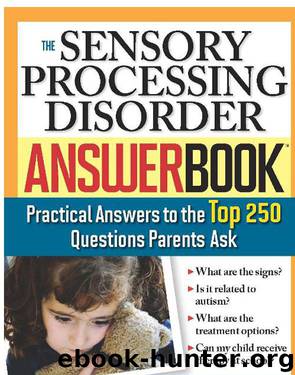The Sensory Processing Disorder Answer Book by Tara Delaney

Author:Tara Delaney
Language: eng
Format: epub
Publisher: Sourcebooks
Published: 2010-07-05T16:00:00+00:00
Chapter 9
SCHOOLBASED THERAPY SCHOOLBASED THERAPY
My child is struggling at school. How do I get help?
Are the eligibility criteria for school-based OT the same at every school?
What areas of need can the school occupational therapist work on?
What if my child’s school district does not endorse Sensory Processing Disorder as a reason for therapy?
What should I expect from the school occupational therapy services?
What if my child’s school occupational therapist isn’t doing enough to help my child?
What are the different types of school-based occupational therapy?
Can my child get speech therapy at school?
My eighteen-month-old may need therapy. Will the schools help me?
What is IDEA?
What is Response to Intervention (RTI)?
What is an IEP?
What is a 504 plan?
What is a behavior plan?
Will my child’s school understand that his behavior is due to sensory processing difficulties?
Q. My child is struggling at school. How do I get help?
A. Contact the school and ask how to have your child evaluated under the Individuals with Disabilities Education Act (IDEA). Under this act and other mandates, your child may qualify for school-based occupational therapy.
To be eligible for school-based OT service, students must:
• Be identified as having a disability that interferes with education
• Have sensorimotor problems that interfere with their ability to manage classroom materials or their self-care needs in school
• Need OT intervention to become more independent or better able to participate in school activities
Before your child can be evaluated at school, you must be notified with a description of any evaluation that the school plans to perform. You must sign a consent form giving your approval before evaluations can proceed.
The professionals evaluating your child will review his files, talk to his teachers and you, and, depending on the type of evaluation, most likely observe your child in his role as a student.
Then a multidisciplinary team will conduct further evaluations according to your child’s educational needs, and each professional will write a report based on the findings. You can request to receive a copy of the report before meeting with the team to discuss the results. If something isn’t clear in the report, you should ask questions until you have a complete understanding of the content.
Once all team members have finished their evaluations, there will be a meeting at which the parents are present to discuss the results of the evaluations. Based on the results of the various evaluations and input from all parties, including you, the parent, an individual education plan (IEP) will be discussed and, if agreed upon, put in place.
Q. Are the eligibility criteria for school-based OT the same at every school?
A. Although the criteria should be the same, some schools interpret the criteria differently, which allows the evaluating therapist more leeway to address each child’s needs. However, because of a new mandate known as Response to Intervention (RTI), many schools are revising their approaches to OT service. Some schools may recommend that the occupational therapist observe and screen a student and then develop a plan on ways to provide in-class strategies that help a student maximize her potential in the classroom.
Download
This site does not store any files on its server. We only index and link to content provided by other sites. Please contact the content providers to delete copyright contents if any and email us, we'll remove relevant links or contents immediately.
Periodization Training for Sports by Tudor Bompa(8271)
Why We Sleep: Unlocking the Power of Sleep and Dreams by Matthew Walker(6723)
Paper Towns by Green John(5190)
The Immortal Life of Henrietta Lacks by Rebecca Skloot(4587)
The Sports Rules Book by Human Kinetics(4386)
Dynamic Alignment Through Imagery by Eric Franklin(4216)
ACSM's Complete Guide to Fitness & Health by ACSM(4060)
Kaplan MCAT Organic Chemistry Review: Created for MCAT 2015 (Kaplan Test Prep) by Kaplan(4012)
Livewired by David Eagleman(3772)
Introduction to Kinesiology by Shirl J. Hoffman(3769)
The Death of the Heart by Elizabeth Bowen(3620)
The River of Consciousness by Oliver Sacks(3604)
Alchemy and Alchemists by C. J. S. Thompson(3520)
Bad Pharma by Ben Goldacre(3427)
Descartes' Error by Antonio Damasio(3278)
The Emperor of All Maladies: A Biography of Cancer by Siddhartha Mukherjee(3162)
The Gene: An Intimate History by Siddhartha Mukherjee(3098)
The Fate of Rome: Climate, Disease, and the End of an Empire (The Princeton History of the Ancient World) by Kyle Harper(3067)
Kaplan MCAT Behavioral Sciences Review: Created for MCAT 2015 (Kaplan Test Prep) by Kaplan(2986)
